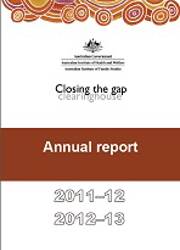Summary
The Closing the Gap Clearinghouse has been jointly funded by all Australian governments for five years until June 2014 under the National Partnership Agreement on an Indigenous Clearinghouse. The Clearinghouse was established to collect, analyse and synthesise evaluation evidence on ‘what works’ to close the gap in Indigenous disadvantage. The Clearinghouse is managed by the Australian Institute of Health and Welfare (AIHW) in collaboration with the Australian Institute of Family Studies (AIFS).
Through the Clearinghouse, policy makers and service providers have access to a growing and authoritative evidence base. The Clearinghouse brings together existing knowledge about addressing Indigenous disadvantage and allows policy makers to search for specific topics, for example, improving early childhood services, improving school completion for Indigenous students, and access to health and preventative health programs. It adds value by translating complex and diverse research findings into publications that are accessible to decision makers, policy analysts, and others.
This report outlines the achievements of the Clearinghouse operations during the past two years. During this time, we have focused on improving the dissemination of Clearinghouse findings through policy workshops, public seminars, and improvements to the website.
In addition, in October 2012 the AIHW was invited to give a presentation to the Productivity Commission roundtable Better Indigenous policies: the role of evaluation based on the work of the Clearinghouse. The paper on the presentation, Evaluating Indigenous Programs and Policies: Communicating the Outcomes by David Kalisch and Fadwa Al-Yaman was published by the Productivity Commission in April 2013.
Seven COAG building blocks provide the framework for the Clearinghouse work plan. Three COAG building blocks— ‘early childhood’, ‘health’, and ‘safe communities’—were the focus of work in 2011–12, and they are the focus of this report. The other four COAG building blocks were addressed in previous years: ‘schooling’, ‘economic participation’, ‘healthy homes’, and ‘governance and leadership’.
Preliminary material: Preface; Abbreviations
Main findings
- What works
- Gaps in the evidence
Main activities
- Clearinghouse publications
- Clearinghouse collections
- Policy workshops
- Clearinghouse seminars
- Website redevelopment
Structure and governance
- The Clearinghouse Board
- The Scientific Reference Group
- Panel of Indigenous researchers
Future directions
Appendixes:
Appendix A: What works to overcome Indigenous disadvantage
Appendix B: Clearinghouse publications
End matter: Suggested citation; Contacts



